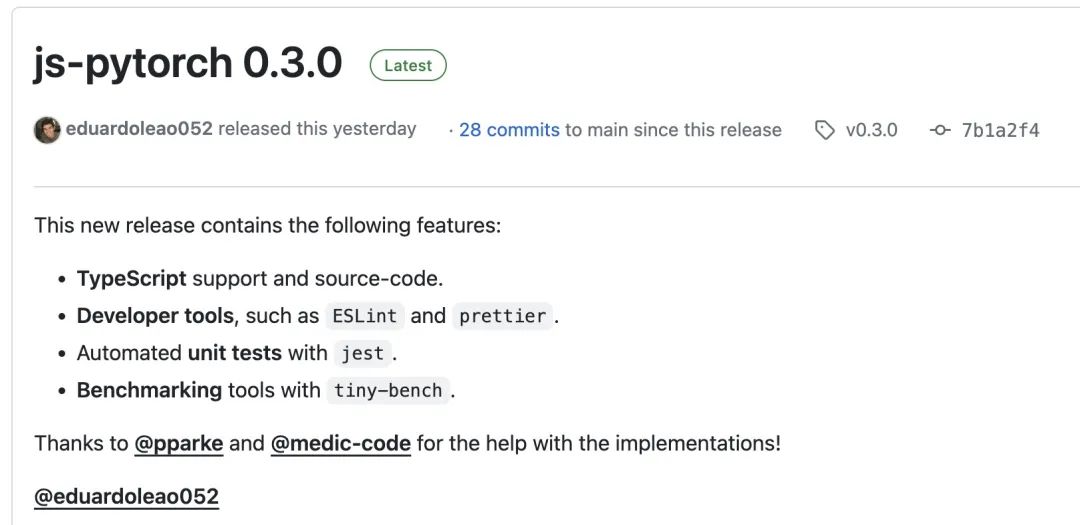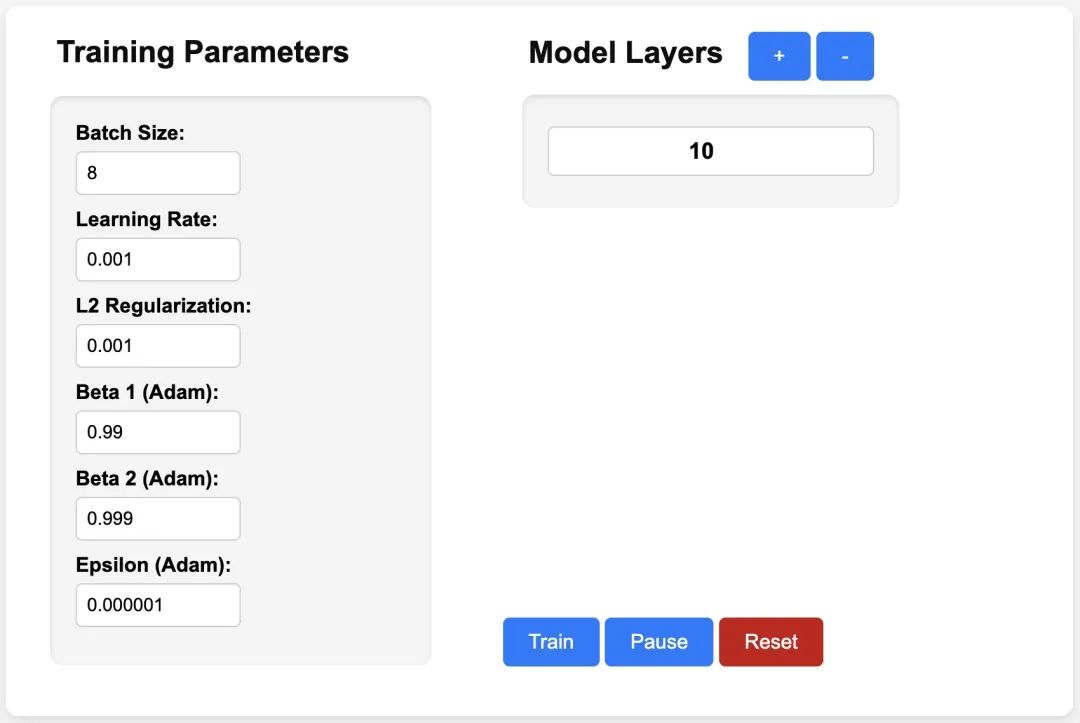JS-Torch 简介
JS-Torch[1] 是一个从零开始构建的深度学习 JavaScript 库,其语法与 PyTorch[2] 非常接近。它包含一个功能齐全的张量对象(可跟踪梯度)、深度学习层和函数,以及一个自动微分引擎。
 图片
图片
PyTorch 是一个开源的深度学习框架,由 Meta 的人工智能研究团队开发和维护。它提供了丰富的工具和库,用于构建和训练神经网络模型。PyTorch 的设计理念是简单、灵活,以及易于使用,它的动态计算图特性使得模型的构建更加直观和灵活。
你可以通过 npm 或 pnpm 来安装 js-pytorch:
npm install js-pytorch
pnpm add js-pytorch或者在线体验 js-pytorch 提供的 Demo[3]:
 图片
图片
https://eduardoleao052.github.io/js-torch/assets/demo/demo.html
JS-Torch 已支持的功能
目前 JS-Torch 已经支持 Add、Subtract、Multiply、Divide 等张量操作,同时也支持Linear、MultiHeadSelfAttention、ReLU 和 LayerNorm 等常用的深度学习层。
Tensor Operations
- Add
- Subtract
- Multiply
- Divide
- Matrix Multiply
- Power
- Square Root
- Exponentiate
- Log
- Sum
- Mean
- Variance
- Transpose
- At
- MaskedFill
- Reshape
Deep Learning Layers
- nn.Linear
- nn.MultiHeadSelfAttention
- nn.FullyConnected
- nn.Block
- nn.Embedding
- nn.PositionalEmbedding
- nn.ReLU
- nn.Softmax
- nn.Dropout
- nn.LayerNorm
- nn.CrossEntropyLoss
JS-Torch 使用示例
Simple Autograd
import { torch } from "js-pytorch";
// Instantiate Tensors:
let x = torch.randn([8, 4, 5]);
let w = torch.randn([8, 5, 4], (requires_grad = true));
let b = torch.tensor([0.2, 0.5, 0.1, 0.0], (requires_grad = true));
// Make calculations:
let out = torch.matmul(x, w);
out = torch.add(out, b);
// Compute gradients on whole graph:
out.backward();
// Get gradients from specific Tensors:
console.log(w.grad);
console.log(b.grad);Complex Autograd (Transformer)
import { torch } from "js-pytorch";
const nn = torch.nn;
class Transformer extends nn.Module {
constructor(vocab_size, hidden_size, n_timesteps, n_heads, p) {
super();
// Instantiate Transformer's Layers:
this.embed = new nn.Embedding(vocab_size, hidden_size);
this.pos_embed = new nn.PositionalEmbedding(n_timesteps, hidden_size);
this.b1 = new nn.Block(
hidden_size,
hidden_size,
n_heads,
n_timesteps,
(dropout_p = p)
);
this.b2 = new nn.Block(
hidden_size,
hidden_size,
n_heads,
n_timesteps,
(dropout_p = p)
);
this.ln = new nn.LayerNorm(hidden_size);
this.linear = new nn.Linear(hidden_size, vocab_size);
}
forward(x) {
let z;
z = torch.add(this.embed.forward(x), this.pos_embed.forward(x));
z = this.b1.forward(z);
z = this.b2.forward(z);
z = this.ln.forward(z);
z = this.linear.forward(z);
return z;
}
}
// Instantiate your custom nn.Module:
const model = new Transformer(
vocab_size,
hidden_size,
n_timesteps,
n_heads,
dropout_p
);
// Define loss function and optimizer:
const loss_func = new nn.CrossEntropyLoss();
const optimizer = new optim.Adam(model.parameters(), (lr = 5e-3), (reg = 0));
// Instantiate sample input and output:
let x = torch.randint(0, vocab_size, [batch_size, n_timesteps, 1]);
let y = torch.randint(0, vocab_size, [batch_size, n_timesteps]);
let loss;
// Training Loop:
for (let i = 0; i < 40; i++) {
// Forward pass through the Transformer:
let z = model.forward(x);
// Get loss:
loss = loss_func.forward(z, y);
// Backpropagate the loss using torch.tensor's backward() method:
loss.backward();
// Update the weights:
optimizer.step();
// Reset the gradients to zero after each training step:
optimizer.zero_grad();
}有了 JS-Torch 之后,在 Node.js、Deno 等 JS Runtime 上跑 AI 应用的日子越来越近了。当然,JS-Torch 要推广起来,它还需要解决一个很重要的问题,即 GPU 加速。目前已有相关的讨论,如果你感兴趣的话,可以进一步阅读相关内容:GPU Support[4] 。
参考资料
[1]JS-Torch: https://github.com/eduardoleao052/js-torch
[2]PyTorch: https://pytorch.org/
[3]Demo: https://eduardoleao052.github.io/js-torch/assets/demo/demo.html
[4]GPU Support: https://github.com/eduardoleao052/js-torch/issues/1

































